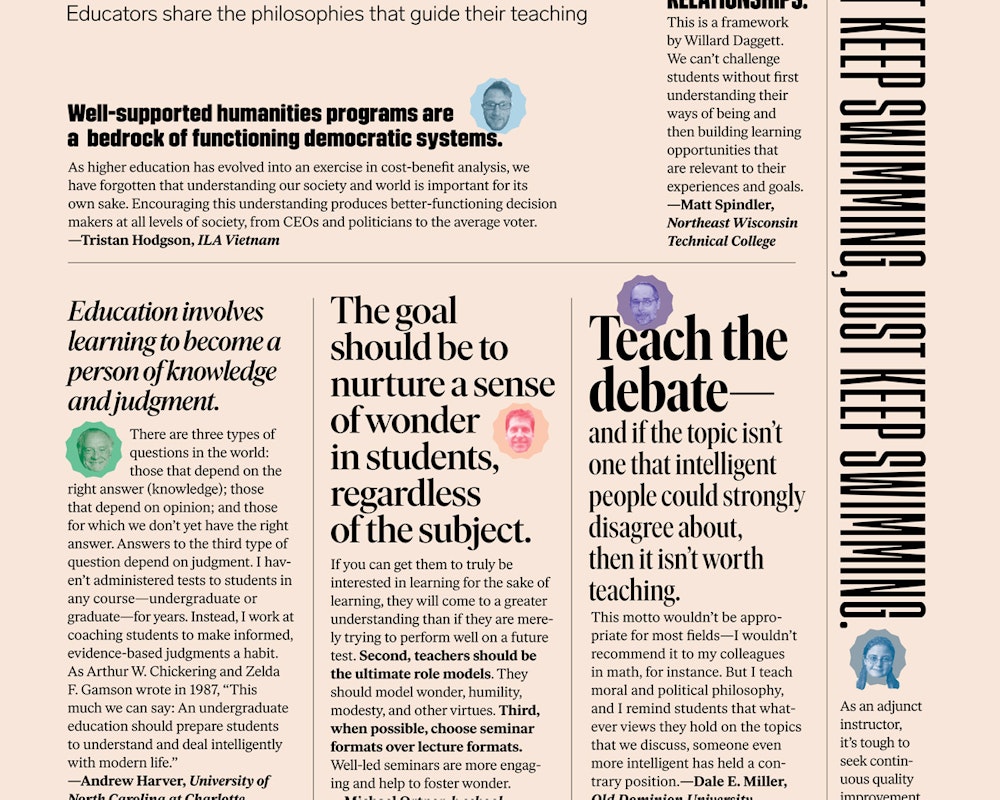
What’s Your Motto?
Educators share the philosophies that guide their teaching
Education involves learning to become a person of knowledge and judgment.
There are three types of questions in the world: those that depend on the right answer (knowledge); those that depend on opinion; and those for which we don’t yet have the right answer. Answers to the third type of question depend on judgment. I haven’t administered tests to students in any course—undergraduate or graduate—for years. Instead, I work at coaching students to make informed, evidence-based judgments a habit. As Arthur W. Chickering and Zelda F. Gamson wrote in 1987, “This much we can say: An undergraduate education should prepare students to understand and deal intelligently with modern life.”
—Andrew Harver, University of North Carolina at Charlotte
Well-supported humanities programs are a bedrock of functioning democratic systems.
As higher education has evolved into an exercise in cost-benefit analysis, we have forgotten that understanding our society and world is important for its own sake. Encouraging this understanding produces better-functioning decision makers at all levels of society, from CEOs and politicians to the average voter.
—Tristan Hodgson, ILA Vietnam
If I am the only person that a student comes in contact with today, I want them to know that they are supported.
In a virtual environment, where resources and supports are not always easily accessible, I make it a point to be deliberate and intentional with every student interaction I have. I provide my name and contact information. I invite students to let me know if they have any personal, academic, or financial difficulties, and I connect them to the right campus resources and supports.
—Helen-Margaret Nasser, Kingsborough Community College
The goal should be to nurture a sense of wonder in students, regardless of the subject.
If you can get them to truly be interested in learning for the sake of learning, they will come to a greater understanding than if they are merely trying to perform well on a future test. Second, teachers should be the ultimate role models. They should model wonder, humility, modesty, and other virtues. Third, when possible, choose seminar formats over lecture formats. Well-led seminars are more engaging and help to foster wonder.
—Michael Ortner, b.school
Teach the debate—and if the topic isn’t one that intelligent people could strongly disagree about, then it isn’t worth teaching.
This motto wouldn’t be appropriate for most fields—I wouldn’t recommend it to my colleagues in math, for instance. But I teach moral and political philosophy, and I remind students that whatever views they hold on the topics that we discuss, someone even more intelligent has held a contrary position.
—Dale E. Miller, Old Dominion University
Rigor, relevance, and relationships.
This is a framework by Willard Daggett. We can’t challenge students without first understanding their ways of being and then building learning opportunities that are relevant to their experiences and goals.
—Matt Spindler, Northeast Wisconsin Technical College
Just keep swimming, just keep swimming.
As an adjunct instructor, it’s tough to seek continuous quality improvement while teaching fifteen credits and around 175 students per semester in order to make it barely over the poverty line. But I do it.
—Michelle Blohm, Eastern Gateway Community College